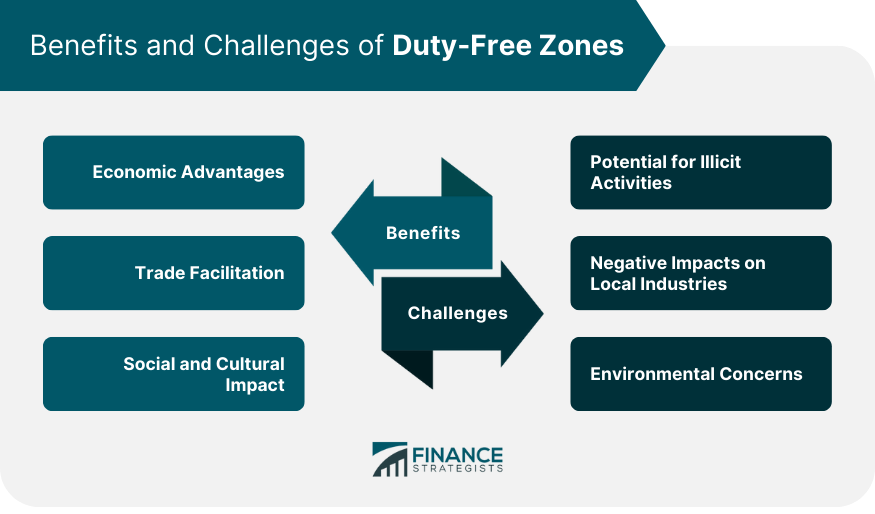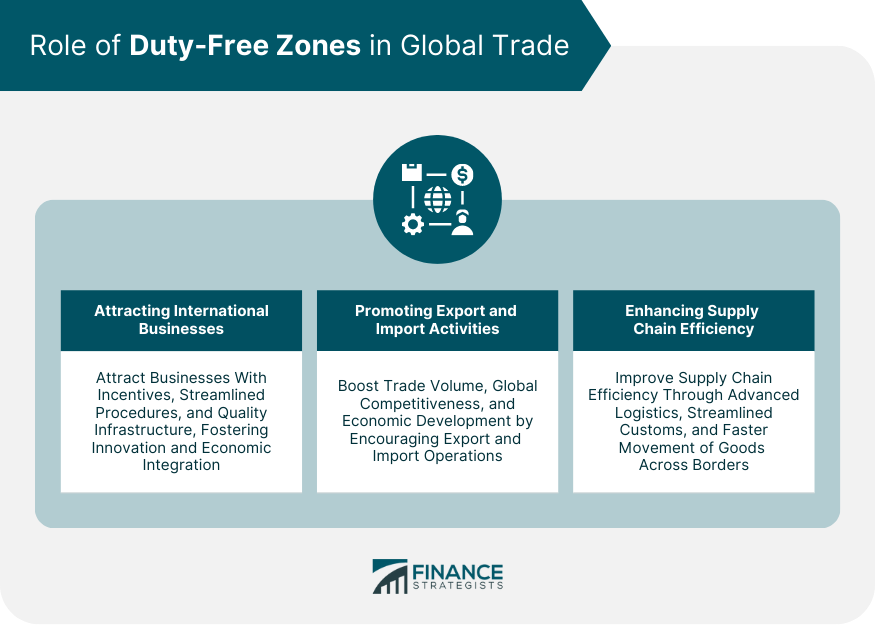Define Duty-Free Zone in Simple Terms
A duty-free shop is a retail store whose goods are not taxed by local or national entities, so long as the goods sold by these stores will be taking the goods out of the country.
It allows travelers to purchase items at lower prices due to the absence of taxes, providing a cost-saving advantage.
These zones are typically located at airports, seaports, or designated areas and aim to facilitate international trade and boost tourism by offering a tax-free shopping experience.
What Does Duty-Free Zone Mean in Finance?
Stores categorized as "duty-free" are typically in a duty-free jurisdiction, known as a "duty-free zone."
A Duty-Free Zone refers to a specific geographical area or jurisdiction where certain tax and duty exemptions are granted to businesses and individuals.
These zones are established to promote international trade, attract foreign investment, and stimulate economic growth.
Within duty-free zones, businesses can operate with reduced or eliminated customs duties, import taxes, and other levies on goods and services. This enables companies to import, export, manufacture, and distribute goods more cost-effectively.
Additionally, duty-free zones often offer streamlined customs procedures, simplified regulations, and favorable business environments to encourage trade and investment.
These zones are commonly found in airports, seaports, and designated areas near borders.
Travelers passing through duty-free zones can enjoy tax-free shopping, purchasing goods such as alcohol, tobacco, luxury items, and cosmetics at lower prices compared to regular retail outlets.
History and Development of Duty-Free Zones
Origin and Early Adoption
The concept of duty-free zones traces its roots back to the free ports of ancient Greece, where traders from various locations converged to trade goods free from taxes.
The modern concept of duty-free zones emerged in the late 19th century, starting with the establishment of the Port of Shannon in Ireland in 1959.
The goal was to stimulate economic activity and employment in a region suffering from significant emigration.
The duty-free zone model offered an innovative solution, providing a platform for businesses to operate with minimal customs intervention, which proved successful in attracting international trade and investment.
Global Expansion of Duty-Free Zones
Following the success of the Shannon Free Zone, the concept of duty-free zones rapidly spread across the globe.
From Asia's bustling manufacturing hubs to America's expansive trade centers, duty-free zones became an essential tool for fostering economic growth, attracting foreign direct investment, and promoting trade.
The late 20th and early 21st centuries witnessed an exponential increase in the number and scope of duty-free zones. From merely a handful in the 1970s, the number of global free zones escalated into thousands, spanning over 135 countries.
These zones evolved to include not only manufacturing and logistics hubs but also financial, research and development, and services-oriented zones.
Benefits of Duty-Free Zones
Economic Advantages
By eliminating or reducing customs duties, they attract businesses seeking to minimize operational costs and maximize profitability.
This can stimulate economic growth by attracting foreign direct investment, boosting employment, and enhancing technology transfer and skill development in the host countries.
Furthermore, by serving as export-processing zones, they can significantly contribute to a nation's export earnings.
They can also play a pivotal role in regional development strategies by encouraging economic activity in less-developed or economically distressed areas, acting as catalysts for growth and development.
Trade Facilitation
Duty-free zones significantly facilitate international trade. By offering streamlined customs procedures, reduced red tape, and advanced infrastructure, they provide an enabling environment for import and export activities.
They offer businesses the ability to maintain stocks closer to their customer base without being burdened by upfront payment of customs duties and taxes.
This improved efficiency and speed of trade processes can give companies a competitive edge in the global marketplace.
Moreover, duty-free zones often act as hubs for logistics, distribution, and supply chain management, further facilitating the smooth flow of goods across borders.
Social and Cultural Impact
By creating employment opportunities, they can contribute to poverty reduction and social stability.
Moreover, they can spur urban development, improve living standards, and contribute to the achievement of broader societal goals.
Moreover, by attracting a diverse array of businesses from different parts of the world, duty-free zones can foster multicultural exchanges and promote cultural understanding.
They serve as melting pots where ideas, cultures, and knowledge intersect, contributing to the enrichment of local communities.
Challenges of Duty-Free Zones
Potential for Illicit Activities
Due to the lax regulatory oversight and customs controls, these zones can inadvertently create opportunities for illicit activities such as smuggling, counterfeiting, and other forms of illegal trade.
Such activities not only pose economic threats but can also undermine the integrity of legitimate businesses operating within these zones.
Therefore, ensuring appropriate regulatory measures and effective enforcement mechanisms is crucial to prevent misuse of these zones for illicit purposes.
Negative Impacts on Local Industries
By attracting foreign businesses with various incentives, these zones can inadvertently create an uneven playing field, disadvantaging domestic firms that do not enjoy the same benefits.
This can lead to deindustrialization and job losses in certain sectors, exacerbating social and economic disparities.
As such, it's crucial to strike a balance between promoting foreign investment and protecting domestic industries.
Environmental Concerns
The rapid industrial activity within these zones can lead to increased pollution, waste generation, and natural resource depletion if not properly managed.
Moreover, the focus on short-term economic gains can often overshadow long-term sustainability considerations.
Therefore, incorporating environmental safeguards and promoting sustainable practices within duty-free zones is essential to mitigate their environmental footprint.

Role of Duty-Free Zones in Global Trade
Attracting International Businesses
Duty-free zones play a crucial role in the global economy by attracting international businesses.
These zones offer numerous incentives, including tax breaks, streamlined customs procedures, and access to quality infrastructure, which make them attractive investment destinations.
By hosting businesses from different sectors and countries, duty-free zones serve as international business hubs, fostering innovation, collaboration, and economic integration.
They can play a pivotal role in shaping global trade dynamics and promoting economic globalization.
Promoting Export and Import Activities
Another vital role of duty-free zones in global trade is their promotion of export and import activities.
These zones, by offering a conducive environment for trade, encourage businesses to engage in export and import operations.
This can boost a country's trade volume, enhance its global trade competitiveness, and contribute to a more balanced and diversified trade portfolio.
Moreover, by fostering export-oriented growth, duty-free zones can support countries in their pursuit of economic development and poverty reduction.
Enhancing Supply Chain Efficiency
By offering advanced logistics and distribution facilities and streamlining customs procedures, these zones can expedite the movement of goods across borders.
This can reduce lead times, minimize inventory costs, and improve the responsiveness of supply chains, providing businesses with a strategic advantage in the fast-paced global marketplace.
In essence, duty-free zones can serve as vital nodes in global supply chains, supporting the seamless flow of goods across national boundaries.

Duty-Free Zone Example
Locations which facilitate travel, such as international airports and seaports, are commonly categorized as duty-free zones due to travelers commonly leaving the country shortly after making a purchase.
While the duty free shop may be tax exempt, travelers may be expected to pay an import tax upon bringing the goods into a new country.
Tax is often incurred only upon bringing goods whose value exceeds a predetermined limit, so retail purchasers often do not need to pay an import tax.
Conclusion
Duty-Free Zones are geographical areas or jurisdictions where certain tax and duty exemptions are granted. They emerged as powerful tools for promoting international trade, attracting foreign investment, and stimulating economic growth.
By offering economic advantages such as reduced customs duties and streamlined customs procedures, these zones create opportunities for businesses to thrive and contribute to regional development.
They facilitate trade by providing an enabling environment for import and export activities and act as hubs for logistics and supply chain management.
Furthermore, Duty-Free Zones have social and cultural impacts, creating employment opportunities, fostering multicultural exchanges, and contributing to societal goals.
However, challenges such as the potential for illicit activities, negative impacts on local industries, and environmental concerns need to be addressed.
Despite these challenges, Duty-Free Zones play a crucial role in attracting international businesses, promoting export and import activities, and enhancing supply chain efficiency.
Duty-Free Zone FAQs
A duty-free shop is a retail store whose goods are not taxed by local or national entities, so long as the goods sold by these stores will be taken out of the country.
Stores categorized as duty-free are typically in a duty-free jurisdiction, known as a duty-free zone.
Locations which facilitate travel, such as international airports and seaports, are commonly categorized as duty-free zones due to travelers commonly leaving the country shortly after making a purchase.
Tax is often incurred only upon bringing goods whose value exceeds a predetermined limit, so retail purchasers often do not need to pay an import tax.
The primary purpose of a free-trade zone is to remove from a seaport, airport, or border those hindrances to trade caused by high tariffs and complex customs regulations.
True Tamplin is a published author, public speaker, CEO of UpDigital, and founder of Finance Strategists.
True is a Certified Educator in Personal Finance (CEPF®), author of The Handy Financial Ratios Guide, a member of the Society for Advancing Business Editing and Writing, contributes to his financial education site, Finance Strategists, and has spoken to various financial communities such as the CFA Institute, as well as university students like his Alma mater, Biola University, where he received a bachelor of science in business and data analytics.
To learn more about True, visit his personal website or view his author profiles on Amazon, Nasdaq and Forbes.











